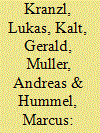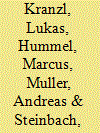| Srl | Item |
| 1 |
ID:
125389


|
|
|
|
|
| Publication |
2013.
|
| Summary/Abstract |
The heating sector has been neglected in energy policies for quite some time, especially on the European level. Only recently, with the implementation of the European directive 2009/28/EC the sector has gained higher attention. The objective of this paper is to provide an overview of the heat market in Austria and of the current status and future prospects of renewable energy in the heat sector (RES-H) up to 2030. Despite the growing energy demand, the share of renewable energy in the total energy demand for space heating and hot water increased from about 20% in 1970 to about 34% in 2008. This is mainly due to ambitious RES-H support instruments and regional policy targets. For example, the government of the region of Upper Austria has implemented a target of 100% RES-H share in the space heating and hot water sector until the year 2030. However, the National Renewable Energy Action Plan for 2020 foresees only moderate growth rates for RES-H compared to recent market growth and scenarios in literature. Due to the ambitious targets and support schemes of regional governments it seems likely that RES-H deployment could growstronger than stated in the action plan.
|
|
|
|
|
|
|
|
|
|
|
|
|
|
|
|
| 2 |
ID:
125392


|
|
|
|
|
| Publication |
2013.
|
| Summary/Abstract |
In the light of the EU directive for renewable energy (2009/28/EC) this paper deals with the question how various policy instruments could impact the development of renewable heating technologies. The paper applies the simulation model Invert/EE-Lab for the building related heat demand in selected European countries (Austria, Lithuania and United Kingdom). The resulting scenarios up to 2030 are compared to RES-Heat targets from literature, stakeholder consultation processes and the targets in the national renewable energy action plans submitted by EU Member States in 2010. The results demonstrate that use obligations for renewable heating can be effective in achieving RES-Heat market growth. However, in order to attain a balanced technology mix and more ambitious targets, policy packages are required combining use obligations with economic incentives and accompanying measures. Technology specific conclusions are derived. Moreover, conclusions indicate that the action plans are not always consistent with policy measures in place or under discussion.
|
|
|
|
|
|
|
|
|
|
|
|
|
|
|
|